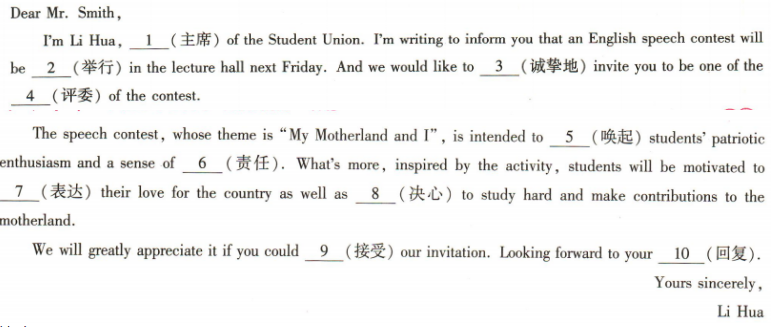2024年高职单招每日一练《英语(中职)》11月11日
考试总分:10分
考试类型:模拟试题
作答时间:60分钟
已答人数:513
试卷答案:有
试卷介绍: 2024年高职单招每日一练《英语(中职)》11月11日专为备考2024年英语(中职)考生准备,帮助考生通过每日坚持练习,逐步提升考试成绩。
试卷预览
-

1. 办公室出租()AInpatient Building
BCashier
COffice to Let
DCounseling Room
ENo Open Flames
FSafety First
GInsert Here
-
Have you ever seen a solar panel(太阳能电池板)in your neighborhood?Solar panels take energy from(1)sun and turn(2)into electricity.In the past ten years,the price of solar panels(3)down greatly.In many parts of the world,solar energy is now(4)form of electricity.More and more people have started using solar energy(5)their homes. However,solar panels also have their problems.They stop(6)at night and(7)rainy days.Is it possible(8)them produce electricity all the time? Scientists at Suzhou University,China,(9)a new solar panel now.It can produce electricity not only from solar energy(10)from falling rain.When a raindrop falls on the solar panel and then(11)down,it creates friction(摩擦力)on the surface of the panel,(12)can then be turned into electricity. Sun Baoquan is one of the(13).“Our new invention can produce electricity in any weather during the day,”he says.It can even provide electricity at night if there(14)rain. The solar panel,(15),does not make much electricity from falling rain.So Sun Baoquan is still working hard(16)it.The scientist(17)wants to make solar panels more flexible,which are as(18)as clothing. The field of solar energy is developing fast.Scientists around the world have been improving solar panels. Some have been(19)on ways to join solar panels and wind power together.Some have been trying(20)sunlight to produce liquid and gas fuels(液体和气体燃料).
2. 第14空填()。Awas
Bwere
Cis
Dare
-
请根据下面的短文内容判断句子,如果正确就填“T”,如果错误就填“F”,如果文中没有提到就填“N”。 People send birthday greetings by using cards in both eastern and western countries.It is not known when and where exactly the tradition of sending birthday cards began.It is believed that it began in England in the early nineteenth century.In those days people sent birthday cards when they couldn't wish somebody a happy birthday in person. In 1840 the first stamp was used in Britain and sending birthday cards became easier,cheaper and more popular.The development of color printing processes(工艺,流程)in the 1930s also helped to increase sales of birthday cards. Today cards are often given with a present,even when people can express their wishes face to face.In recent times e-cards have also become popular.Many people are starting to use e-cards instead of traditional cards because they are free,environmentally friendly and easy to arrive.So will e-cards take place of paper cards completely in ten or twenty years?Probably not.For example,for kids and old people,they don't use e-cards very often. If your birthday is coming soon,do you wish that at least one person could congratulate you with a beautiful card then?
1. Sending birthday cards became more popular after the stamps were used.
-
2. 为了赢得比赛,他们正在刻苦训练。
-
1. We have always worked to ______________ (使……满意)our customers through quality service.
-
2. Only in this way______________(你才能完成任务).
-
1. 以下是李华写给校外籍教师Mr.Smith的一封信,在信中他告知Mr.Smith英语演讲比赛的有关内容。请根据括号里的中文信息将内容补充完整。

-
2. 假设你是李华,你的美国笔友David最近在学汉语,他给你发来一封电子邮件讲述他对学习汉语很感兴趣,但是他在学习汉语的过程中常常因为犯错误而懊恼。请你用英语给他回一封邮件。内容应包括以下要点: (1)鼓励他继续努力,正确看待错误; (2)给他提出一些学习汉语的建议(至少两条)。注意: (1)字数60~80词: (2)不得出现考生真实信息。

-
请根据以下短文内容,回答短文后面的问题,答题词数不得超过10个单词。 Many of us read news every day.It's probably because we'd like to know what's happening in the world.Today we can get news from TV or the Internet,but how did ancient people get news? At the very beginning,information spread by word of mouth.People living in tribes(部落)got news from neighbors or travelers.Ancient Romans changed the way people knew about their communities.They posted a list of daily happenings at public squares in the cities.Ancient Chinese people did it in another way.The government had news sheets sent to officials in the whole country so people could know what was going on in the capital. The fifteenth century saw big progress in printing technology in the West.The progress brought a sudden rise of news business.Printers sold whatever people loved to read.In the sixteenth century,the first real newspapers appeared.People started to form the habit of reading newspapers.They liked to share their opinions on newspapers.The invention of telegraph(电报)machines led to another big step in history.News stories were sent to the papers in minutes instead of weeks. Now we get news in seconds from all over the world.We can become some kind of reporters by posting online what happens around us.
1. From whom did people living in tribes get news?
-
请根据以下短文内容,回答短文后面的问题,答题词数不得超过10个单词。 Contrary to popular belief,colds are not caused by exposure to severe weather.Colds are caused by viruses inside,and you're safer when skiing or even waiting for the bus on a snowy day than you are in a warm room, surrounded by friends,co-workers,or fellow students,who just may be passing the viruses around.If you feel a chill,you're already sick.A chill is an early sign:It's the cold that causes the chill,not the other way around. While the virus can spread through air when a cold-sufferer coughs or sneezes,surprisingly,this is not the most common route of transmission.Numerous studies have now shown that the majority of colds are“caught”by hand contact.A cold-sufferer rubs her nose,thereby transferring the virus to her hand.Then a friend comes to visit.“Don't kiss me,”she warns,so the friend steps back and presses her hand.The friend then wipes her own nose or eyes,and several days later is stricken with a cold.Or parents pick up their child's used tissues and carefully throw them away,but fail to wash their hands afterwards. Cold viruses also can be transferred to objects—telephones,towels,plates—and remain infectious for up to three hours.Frequent hand-washing—on the part of the cold-sufferer as well as other members of the household— will minimize the spread of viruses.
2. What is the early sign of the cold?
相关试卷
相关题库